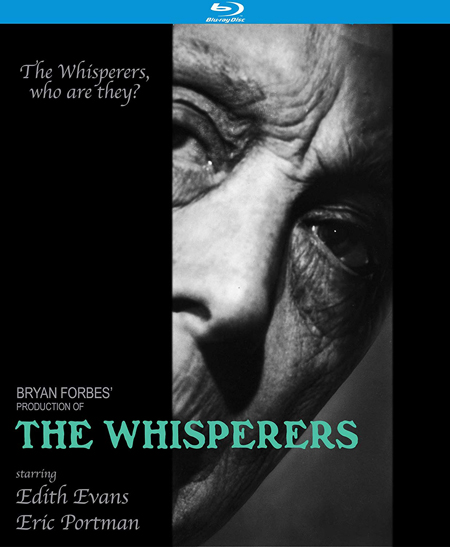
“ARE
YOU THERE?â€
By
Raymond Benson
Writer/director/actor
Bryan Forbes was a major force in the British film industry for several
decades, having started in the 1950s at times as an actor in films and then in other
instances as a screenwriter, and then he moved into directing (his astonishing
directorial debut, Whistle Down the Wind, was released in 1961). Forbes
made several good pictures, the most famous probably being The Stepford
Wives in the 70s.
Forbes
also had connections to the world of James Bond. Forbes’ first screenwriting
duties were for Albert R. Broccoli’s Warwick Films in the 1950s. When Forbes
began writing novels, his literary agent was none other than Peter
Janson-Smith, who had been Ian Fleming’s agent. Astute Bond fans will also spot
other connections in The Whisperers, such as a John Barry score, and the
appearance of Robin Bailey, the actor who, in the pre-credits sequence of You
Only Live Twice, plays the Foreign Secretary mediating between the Russians
and the Americans (“May I ask what motive our Russian friends would have for
wishing to destroy American spacecraft?â€).
The
Whisperers,
released in 1967, was a solid art-house hit starring Dame Edith Evans, earning
her a third Oscar nomination in the four years between 1963-1967, this one for
lead actress, the other two for supporting (for Tom Jones and The
Chalk Garden). While she didn’t win the Oscar for The Whisperers,
she did win the BAFTA, the Golden Globe, the New York Film Critics Award, and
the National Board of Review Award. Evans was a major star of the British
stage, but she made only a few films very early in her career (mostly the 30s)
and late (the 60s).
The
story is rather dreary and harkens back to the “kitchen-sink dramas†of the
late 50s/early 60s that came out of Britain. It’s shot in black and white and
focuses on a poor, working class neighborhood in a small town in the north of
England. Margaret Ross (Evans) is old, lives alone, is on her way to a case of
Alzheimer’s (a term not known then), and is delusional. Every time she enters
her flat, she calls out, “Are you there?†because she hears voices in the pipes
and walls. The place is a dump full of junk, stacks of newspapers and rotting
books, and clutter that would scare anyone away. Her scoundrel husband, Archie
(Eric Portman), ran off two decades earlier, and her grown son, Charlie (Ronald
Fraser), is a crook who is sent to jail shortly after hiding a stash of stolen
cash in his mother’s flat. Mrs. Ross continually lies to the National
Assistance agent, although she probably believes the stories she tells. Her
discovery of Charlie’s money changes things, though, and before long, estranged
husband Archie returns to take advantage of the woman. Things do not go well.
As
a statement on the condition of poverty in England at the time, The
Whisperers is a potent social problem film. Evans indeed delivers a
powerful performance as a paranoid, frightened woman at the end of her rope. Tellingly,
the National Assistance was revamped into the Supplementary Benefit around the
time the movie was made.
Kino
Lorber’s 1920x1080p high definition restoration suitably displays Gerry
Turpin’s monochrome cinematography that illustrates the bleakness of Mrs. Ross’
world. There are English subtitles for the hearing-impaired, as well as an
audio commentary by film historian Kat Ellinger. The only supplements are
trailers for this and other Kino Lorber titles.
The
Whisperers might
be depressing, but it’s also example of fine British talent in the form of both
Forbes and Evans at the top of their games.
CLICK HERE TO ORDER FROM AMAZON